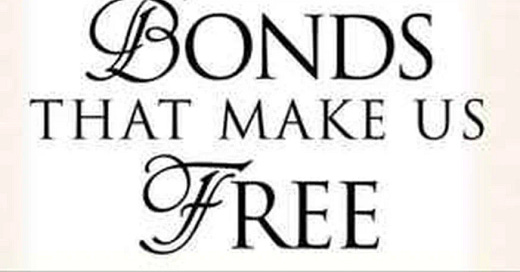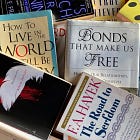Bonds That Make Us Free Session 0: Fully Informed
"People can change fundamentally—in their hearts and not just in their outward behavior.”
Mindset Shifts U begins our study of Bonds That Make Us Free with chapters 1 and 2 this Saturday, June 22.
Yesterday, John Real observed, “I started reading Bonds this morning. I was not expecting the first two chapters to filet me open right to my soul.”
In the first sentence of his preface to Bonds That Make Us Free, philosopher C. Terry Warner tells us, “People can change fundamentally—in their hearts and not just in their outward behavior.” As John can attest, Warner is not kidding.
There is all the difference between changing our behavior and making profound attitudinal changes. The latter reorients how we walk in the world. Warner writes, “Not many people believe [that fundamental change is possible.] Most are convinced that our genetic structure and life experiences have dictated the kind of people we have become. Hence any changes we might make will be behavioral, not emotional and attitudinal.”
So why don’t we change? When Warner answers this, he hides nothing:
Why then, if we are able to change fundamentally, don’t we do it? Why do we get and keep ourselves stuck in anxiety, suspicion, resentment, or anger if we all have the power to do otherwise? The answer to this extraordinarily challenging and fascinating question is that we devise and hang on to our emotional problems for a purpose, a purpose more important to us than our happiness. And we deceive ourselves about the fact that this is what we’re doing. We participate in the creation of our emotional troubles and deny we’ve had any part in it. In regard to our troubling emotions and attitudes, we are our own worst enemies.
This book is for you if you are willing to open the door just a crack to consider how tightly you hold your problems and how often you rehearse your grievances. Your willingness has satisfied one of the conditions for making the most of our Bonds study sessions. Unlike corporate “terms and conditions,” your agreement is only with yourself.
But why do we avoid looking at the truth behind our emotional problems? Are we concerned we are fundamentally flawed? Warner clarifies, we are all in the same boat and seeing our common humanity is part of the cure. In his book Warner shares many true stories of people who were determined to be right about their grievances and then had a change of heart.
It's as though we all have the same bingo cards. Warner writes of students who “recognized themselves in each other’s stories: every story was, except for details, their own story too.” Warner continues,
By resonating with the storyteller they recalled situations in their own lives that they had previously not remembered truthfully. They discovered, with relief and joy, that their fears about themselves and resentments toward others—the very emotions that had troubled them—were gone.
Stories are not enough. Warner provides a theoretical foundation that helps us generalize our learning: “A correct understanding of why we feel and think and act as we do helps to set us free. Developing that understanding is the point of the explanations.”
But we won’t find the peace and clarity we seek through mere reason. Warner writes, “This has sometimes been my own besetting self-deception—to think self-understanding is to be achieved by reason rather than by honesty.”
My earlier post on theory and practice may be helpful to review:
The mindset shift we seek won’t happen in an atmosphere of self-condemnation. If we want to insist we are fatally flawed, we will stubbornly resist Warner’s message:
We will discover in this book that the self any of us doubts, feels ashamed or guilty about, perhaps even wishes to annihilate, is not really who we are, but a fear-driven phantasm, not grounded in reality. Until we make this discovery, the early chapters, where we will talk about the origin of this phantasm and the destruction it causes, may leave us feeling hopeless. They may stir up old feelings that we can’t “measure up.”
What can be more hopeful than this observation by Warner: “Your self-doubts, if you have them, aren’t about you at all, but about a misconception of yourself, a false self-image, that you can be rid of—provided you give way to the truth and not your fear of it.”
We will see that our self-doubt, shame, and judgment of ourselves and others are all part of the same self-referential system, and the system can dissolve.
Because it is a portal to truth, I have often turned to Bonds over the decades. I hope you find it valuable, too.
Again, Mindset Shifts U begins Bonds this Saturday, June 22, with chapters 1 and 2.
If you upgrade to a paid subscription for Mindset Shifts, you will have access to previous sessions of Mindset Shifts U and future sessions of Bonds and other books.
Here are excerpts from reviews of Bonds That Make Us Free by readers posting on Amazon:
It is not a difficult book to read. It's relatively easy reading. The only hard part is when you see yourself and your loved ones in the tales that others tell of themselves in the many vignettes. Some of this is hard. Hard in the way that we have to look at ourselves in the mirror in the morning. It's not always a pretty sight, but by doing so, we see ourselves as we are, and perhaps can make some improvements.
Bonds That Make Us Free absolutely annihilates all of our selfish beliefs and grievances, in the most compassionate way possible. Some say that Warner is too blunt with his wording. He is bold, but not overbearing. Being bold is actually loving because you are making yourself vulnerable in order to help someone. Truth will always be offensive to the proud, and that is unavoidable. But I think that even a prideful person may have their heart softened by reading this book.
It's a little frightening to realize how much control you actually have over yourself, because it makes you responsible for your own happiness. That may make you feel defensively angry or guilty, but if you're really ready to be honest with yourself and take on this responsibility, you'll feel humble instead--and then, working on these relationships with a new heart, at peace.
A group member recently wrote of past Mindset Shifts U sessions, “I just have to review this every so often…and suddenly, there’s clarity.” To be sure, progress is never linearly upward, and there are times when we perceive we have lost our clarity only to come out on the other side of that “slump” with a deeper ability to put what we are learning into practice.






Nice. We can have no hope of changing our own reality if we are unwilling to shift our perspectives, if we are unwilling to change ourselves.